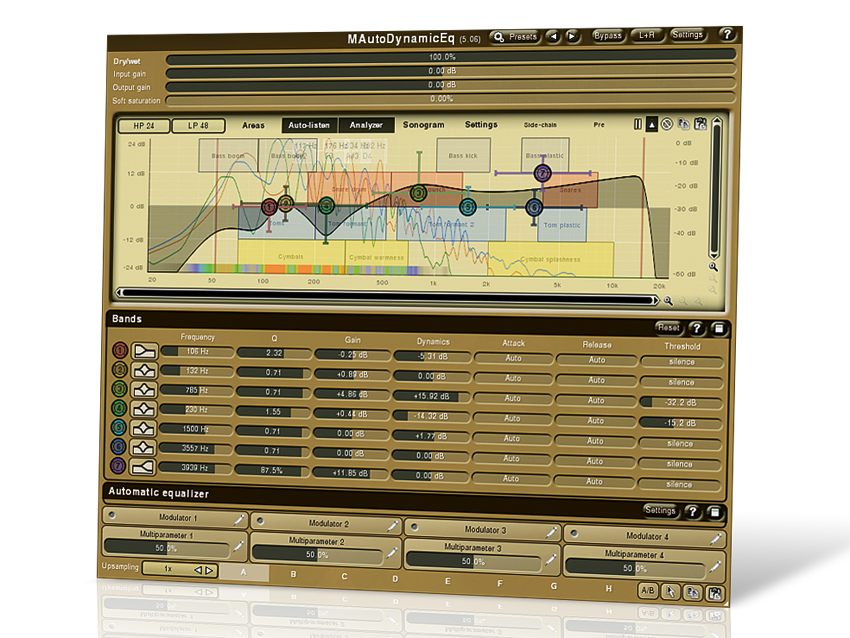MusicRadar Verdict
Match and dynamic EQ succesfully brought together in one plug-in, delivering both with equal aplomb.
Pros
- +
Flexible EQ styles; good visual feedback; auto-listen option; seven bands plus filters; useful Auto EQ presets.
Cons
- -
No band solo; slightly odd combination of processing.
MusicRadar's got your back
We've reviewed quite a few MeldaProduction plug-ins in the past, and we've always come away impressed by their great depth and facility, often combined with multiband functionality.
MAutoDynamicEQ is another multibander, but this one joins together two other Melda processors - Dynamic EQ and AutoEqualizer - in a 7-band EQ plug-in.
"Having the most important parameters readily to hand makes applying dynamic EQ adjustments very easy."
The Dynamic EQ half applies an EQ curve in response to the incoming signal level, meaning you can cut or boost a specific volume range. The AutoEqualizer half, meanwhile, is Melda's version of 'match' EQ.
With this, you can input both source and target signals, and have the frequency shape of the former imposed on the latter. Cleverly, it also enables you to 'separate' the target from the source, removing the dominant frequencies analysed in the source signal from the target, in order to help the two fit together better.
Auto additions
It's worth mentioning that Melda has included some rather interesting extras beyond the standard analyse/match concept. First, you can select a standard audio file as your source, giving you the ability to load an 'offline' analysis curve rather than play one in via your DAW in real time. Further to that, Melda has thrown in a bunch of source files of its own making.
The vast majority of these are actually analysis files derived from commercial tracks, across 10 genres, ranging from jazz to metal to pop, hip-hop and funk. This is a valuable inclusion, giving you access to the frequency curves of tracks you may not have to hand or even be aware of.
Want all the hottest music and gear news, reviews, deals, features and more, direct to your inbox? Sign up here.
Finally, there's a draw mode where you can draw a multipoint curve of your own by hand for the source analysis. This is powerful stuff that, in many respects, goes beyond other matching EQs we've tried.
Dynamic deeds
MAutoDynamicEQ's architecture offers seven flexible bands (11 filter shapes) plus high- and low-pass filters (6-120dB/octave), and the filter shapes include two shelf types, slope, peak, band-pass, notch and band/shelf combos.
The plug-in can, of course, be used as a standard EQ, but each band also features a full set of dynamic controls, including gain limits (Dynamics), Threshold, Attack and Release (both with Auto settings), and three modes of signal analysis (Filtered compensated, Filtered and Entire spectrum). Overall, there's a lot going on here, which is why each processing section gets an 'advanced settings' window too.
The main window includes two foldaway sections (Bands and Automatic equalizer) and a flexible graphical display. This is laden with useful features, including an analyser, a sonogram, a colour-coded frequency ranges display and Auto-listen, which solos the frequencies being processed by the currently selected band, pre-EQ.
Finally, as with many other Melda plug-ins, a series of controls at the bottom of the interface gives access to the Modulators (LFOs, envelopes, etc) and Multiparameters (macros), for further user-definable control.
Automatic for the people
Having the most important parameters readily to hand makes applying dynamic EQ adjustments very easy. What's more, you can dive in and make adjustments directly in the display, too.
Dynamic EQ is useful for notching out annoying stuff from already blended material (such as loops) in a less obvious way than standard EQ. Melda's plug-in handles such tasks with ease, and the seven bands combined with standard EQ options make it all feel like a logical extension of a regular EQ.
We found it particularly good at not only processing drum loops, but also regular solo instruments such as bass, piano and guitars, as well as more blended sounds such as live drums.
Other useful features include the global mix blend, which we found particularly handy when using the Automatic EQ in 'separate' mode. The only thing we'd like to see added would be a band solo function.
Overall, combining match and dynamic EQ in one plug-in delivers a potent processor, although much of the time you'll be using one or the other. Even so, it's another powerful offering from Melda that handles some tricky engineering situations extremely well.
Computer Music magazine is the world’s best selling publication dedicated solely to making great music with your Mac or PC computer. Each issue it brings its lucky readers the best in cutting-edge tutorials, need-to-know, expert software reviews and even all the tools you actually need to make great music today, courtesy of our legendary CM Plugin Suite.

